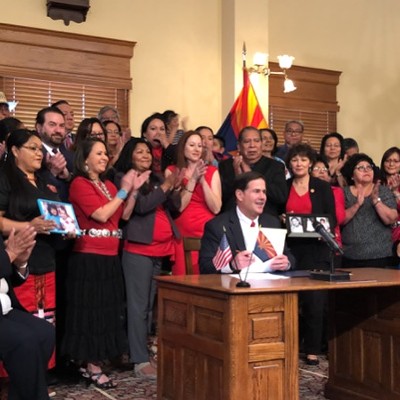Rather than pitching more slash-and-burn budget drafts, the Republican leadership boosted school spending while snipping away at less-popular strands of the social safety net, such as preschool care.
Republicans who crafted the budgets--totaling roughly $8.1 billion in both chambers, although key differences remained to be sorted out this week--boast that they propose to spend more than Gov. Janet Napolitano, who pitched a $7.9 billion budget in January. The GOP budgets increase spending on education, universities and prisons while delivering a targeted tax cut, possibly on business property taxes. But they also include less borrowing than Napolitano's proposal (particularly on school construction), along with less spending to aid poor Arizonans.
In an odd twist, the House--which has traditionally been a more conservative body--proposes to spend more than the Senate.
The GOP leadership's newfound generosity is possible thanks to a surging Arizona economy that continues to outpace expectations. Through the end of January, the state had brought in more than $250 million more than anticipated in last year's budget forecasts. An anticipated surplus from this year, combined with sunny expectations for next year, has allowed the Legislature to propose increasing spending by about $800 million more than this year's $7.3 billion.
While the budgets increase education spending to help teachers cover increasing medical costs, the Republican budgets don't expand all-day kindergarten--one of Napolitano's top priorities.
The GOP budget proposals also hammer at programs that help low-income parents and their children. Case in point: child-care subsidies that now help cover the cost of preschool--on a sliding scale--of about 44,200 kids from low-income families.
Under the cover of "reform," the GOP budgets would create new limits on eligibility. Individual kids will be allowed only two years of subsidized child care; each household would be limited to five years. In addition, the proposals create new co-payments that would rise the longer children remain in the program.
The Senate plan also lowers the eligibility level so that only families at 145 percent of the poverty line--roughly $22,700 for a family of three--can get aid. That new limit would deny child-care assistance to roughly 20,000 kids, according to Penelope Jacks of the Children's Action Alliance, an advocacy group that lobbies for children's issues
The reforms are really just "underhanded ways of cutting the money," Jacks says. "When I had my baby, I went back to work when he was 6 weeks old, and when he was 2 years and 6 weeks, he was not ready to take care of himself. He needed child care until he went to school."
If welfare reform is going to work, Jacks argues, single mothers in the workforce need reliable child care.
"People will either quit their jobs or put their children in very unsafe environments while they go to work," says Jacks. "Some of those situations people have to put their children in when there is no child-care subsidy and they can't afford child care are almost guaranteed to end in a disaster."
Jacks gripes that the GOP budget proposal also retains newly enacted premiums for KidsCare, the program that provides health insurance for low-income kids; fails to increase spending for inspection of child-care facilities; and freezes funding for a variety of foster-care programs.
The Senate budget also eliminates $140,000 in funding for health insurance for kids transitioning out of foster care and cuts $8.7 million from Healthy Families, a program that helps teach parenting skills.
"It's so short-sighted to cut these programs that work, because then the next time we see these children, we have costs associated with taking them away from families that have abused them," Jacks says. "A little prevention goes so far."
House and Senate leaders were confidently rounding up votes to pass their budget by the end of this week. But without an expansion of all-day kindergarten, it faces a likely veto by Napolitano, who in her first two years as governor has avoided having to reject a budget bill.

















